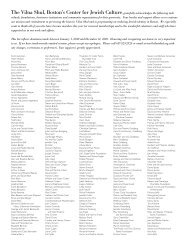You also want an ePaper? Increase the reach of your titles
YUMPU automatically turns print PDFs into web optimized ePapers that Google loves.
Evening Service<br />
Ma’ariv<br />
מעריב<br />
What does it mean to be called to worship? All serious activity requires preparati<strong>on</strong>. <strong>The</strong> prayers<br />
and blessings that precede Barekhu help <strong>the</strong> individual focus <strong>on</strong> prayer. With <strong>the</strong> Barekhu,<br />
communal prayer begins. <strong>The</strong> prayer is a call to worship, which can <strong>on</strong>ly be recited when a<br />
minyan (10 people) is present. By leading <strong>the</strong> Barekhu, <strong>the</strong> leader asks if <strong>the</strong> Community is ready<br />
for prayer. <strong>The</strong> Community resp<strong>on</strong>ds in <strong>the</strong> affirmative. <strong>The</strong> c<strong>on</strong>cept of <strong>the</strong> Barekhu can be<br />
traced to Nehemia 9:5: “<strong>The</strong>n <strong>the</strong> Levites…said: ‘Stand up and bless [barekhu] <strong>the</strong> Lord, your<br />
God, from everlasting to everlasting, and let <strong>the</strong>m say, ‘Blessed be Thy glorious Name, that is<br />
exalting above all blesssings and praise.’” Rabbi Akiba suggests that <strong>the</strong> formula be “Praise <strong>the</strong><br />
Lord,” while Rabbi Ishmael, whose view was accepted, stated that it should be “Praise <strong>the</strong> Lord,<br />
Who is praised.” <strong>The</strong> Talmud states that a pers<strong>on</strong> should never exclude himself from <strong>the</strong><br />
Community. Thus, it was felt that it would be preferable for <strong>the</strong> leader to say “Let us praise”<br />
ra<strong>the</strong>r than “Praise.” It was finally decided that it would be satisfactory for <strong>the</strong> leader to say<br />
“Barekhu” if <strong>the</strong>n repeating <strong>the</strong> communal resp<strong>on</strong>se so as to be included within <strong>the</strong> group’s<br />
declarati<strong>on</strong>.<br />
Here I am, waiting, Watching, Listening. Attending to what is within and without. <strong>The</strong> whispered breath of God fills<br />
me with w<strong>on</strong>der and wisdom, and I bend, embraced by <strong>the</strong> One who is all. For a moment, I no l<strong>on</strong>ger breath. I am<br />
brea<strong>the</strong>d. For an instant, I know truth of who I am—God’s breath, a fleeting exhalati<strong>on</strong> of All into This. How<br />
w<strong>on</strong>drous this moment when breath brea<strong>the</strong>s and knows itself Divine!<br />
- Rabbi Rami Shapiro<br />
— 20 —




